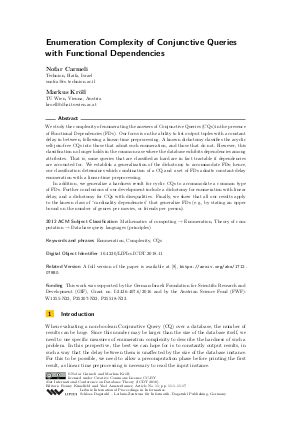Enumeration Complexity of Conjunctive Queries with Functional Dependencies
Authors Nofar Carmeli, Markus Kröll
-
Part of:
Volume:
21st International Conference on Database Theory (ICDT 2018)
Part of: Series: Leibniz International Proceedings in Informatics (LIPIcs)
Part of: Conference: International Conference on Database Theory (ICDT) - License:
 Creative Commons Attribution 3.0 Unported license
Creative Commons Attribution 3.0 Unported license
- Publication Date: 2018-03-05
File

PDF
LIPIcs.ICDT.2018.11.pdf
- Filesize: 0.48 MB
- 17 pages
Document Identifiers
Subject Classification
Keywords
- Enumeration
- Complexity
- CQs
Metrics
- Access Statistics
-
Total Accesses (updated on a weekly basis)
0Document
0Metadata
Abstract
We study the complexity of enumerating the answers of Conjunctive Queries (CQs) in the presence of Functional Dependencies (FDs). Our focus is on the ability to list output tuples with a constant delay in between, following a linear-time preprocessing. A known dichotomy classifies the acyclic self-join-free CQs into those that admit such enumeration, and those that do not. However, this classification no longer holds in the common case where the database exhibits dependencies among attributes. That is, some queries that are classified as hard are in fact tractable if dependencies are accounted for. We establish a generalization of the dichotomy to accommodate FDs; hence, our classification determines which combination of a CQ and a set of FDs admits constant-delay enumeration with a linear-time preprocessing. In addition, we generalize a hardness result for cyclic CQs to accommodate a common type of FDs. Further conclusions of our development include a dichotomy for enumeration with linear delay, and a dichotomy for CQs with disequalities. Finally, we show that all our results apply to the known class of "cardinality dependencies" that generalize FDs (e.g., by stating an upper bound on the number of genres per movies, or friends per person).
Cite As Get BibTex
Nofar Carmeli and Markus Kröll. Enumeration Complexity of Conjunctive Queries with Functional Dependencies. In 21st International Conference on Database Theory (ICDT 2018). Leibniz International Proceedings in Informatics (LIPIcs), Volume 98, pp. 11:1-11:17, Schloss Dagstuhl – Leibniz-Zentrum für Informatik (2018)
https://doi.org/10.4230/LIPIcs.ICDT.2018.11
BibTex
@InProceedings{carmeli_et_al:LIPIcs.ICDT.2018.11,
author = {Carmeli, Nofar and Kr\"{o}ll, Markus},
title = {{Enumeration Complexity of Conjunctive Queries with Functional Dependencies}},
booktitle = {21st International Conference on Database Theory (ICDT 2018)},
pages = {11:1--11:17},
series = {Leibniz International Proceedings in Informatics (LIPIcs)},
ISBN = {978-3-95977-063-7},
ISSN = {1868-8969},
year = {2018},
volume = {98},
editor = {Kimelfeld, Benny and Amsterdamer, Yael},
publisher = {Schloss Dagstuhl -- Leibniz-Zentrum f{\"u}r Informatik},
address = {Dagstuhl, Germany},
URL = {https://drops.dagstuhl.de/entities/document/10.4230/LIPIcs.ICDT.2018.11},
URN = {urn:nbn:de:0030-drops-85988},
doi = {10.4230/LIPIcs.ICDT.2018.11},
annote = {Keywords: Enumeration, Complexity, CQs}
}
Author Details
References
-
Amir Abboud and Virginia Vassilevska Williams. Popular conjectures imply strong lower bounds for dynamic problems. In Foundations of Computer Science (FOCS), 2014 IEEE 55th Annual Symposium on, pages 434-443. IEEE, 2014.

-
Myrto Arapinis, Diego Figueira, and Marco Gaboardi. Sensitivity of counting queries. In 43rd International Colloquium on Automata, Languages, and Programming, ICALP 2016, Rome, Italy, pages 120:1-120:13, 2016.

-
Guillaume Bagan, Arnaud Durand, and Etienne Grandjean. On acyclic conjunctive queries and constant delay enumeration. In International Workshop on Computer Science Logic, pages 208-222. Springer, 2007.

- Catriel Beeri, Ronald Fagin, David Maier, and Mihalis Yannakakis. On the desirability of acyclic database schemes. J. ACM, 30(3):479-513, 1983. URL: http://dx.doi.org/10.1145/2402.322389.
-
Christoph Berkholz, Jens Keppeler, and Nicole Schweikardt. Answering conjunctive queries under updates. In Proceedings of the 36th ACM SIGMOD-SIGACT-SIGAI Symposium on Principles of Database Systems, PODS 2017, Chicago, IL, USA, May 14-19, 2017, pages 303-318, 2017.

-
Johann Brault-Baron. De la pertinence de l’énumération: complexité en logiques propositionnelle et du premier ordre. PhD thesis, Université de Caen, 2013.

-
Yang Cao, Wenfei Fan, Tianyu Wo, and Wenyuan Yu. Bounded conjunctive queries. PVLDB, 7(12):1231-1242, 2014.

- Nofar Carmeli and Markus Kröll. Enumeration complexity of conjunctive queries with functional dependencies. CoRR, abs/1712.07880, 2017. URL: http://arxiv.org/abs/1712.07880.
-
Nadia Creignou, Markus Kröll, Reinhard Pichler, Sebastian Skritek, and Heribert Vollmer. On the complexity of hard enumeration problems. In Language and Automata Theory and Applications - 11th International Conference, LATA 2017, Umeå, Sweden, pages 183-195, 2017.

-
Arnaud Durand, Nicole Schweikardt, and Luc Segoufin. Enumerating answers to first-order queries over databases of low degree. In Proceedings of the 33rd ACM SIGMOD-SIGACT-SIGART Symposium on Principles of Database Systems, PODS '14, pages 121-131, 2014.

- François Le Gall. Powers of tensors and fast matrix multiplication. In Katsusuke Nabeshima, Kosaku Nagasaka, Franz Winkler, and Ágnes Szántó, editors, International Symposium on Symbolic and Algebraic Computation, ISSAC '14, Kobe, Japan, July 23-25, 2014, pages 296-303. ACM, 2014. URL: http://dx.doi.org/10.1145/2608628.2608664.
- Etienne Grandjean. Sorting, linear time and the satisfiability problem. Ann. Math. Artif. Intell., 16:183-236, 1996. URL: http://dx.doi.org/10.1007/BF02127798.
- Benny Kimelfeld. A dichotomy in the complexity of deletion propagation with functional dependencies. In Michael Benedikt, Markus Krötzsch, and Maurizio Lenzerini, editors, Proceedings of the 31st ACM SIGMOD-SIGACT-SIGART Symposium on Principles of Database Systems, PODS 2012, Scottsdale, AZ, USA, May 20-24, 2012, pages 191-202. ACM, 2012. URL: http://dx.doi.org/10.1145/2213556.2213584.
-
Christos H. Papadimitriou and Mihalis Yannakakis. On the complexity of database queries. J. Comput. Syst. Sci., 58(3):407-427, 1999.

-
Luc Segoufin and Alexandre Vigny. Constant delay enumeration for FO queries over databases with local bounded expansion. In 20th International Conference on Database Theory, ICDT 2017, Venice, Italy, pages 20:1-20:16, 2017.

- Yann Strozecki. Enumeration complexity and matroid decomposition. PhD thesis, Université Paris Diderot - Paris 7, 2010. Available at URL: http://www.prism.uvsq.fr/~ystr/these_strozecki.
-
Virginia Vassilevska Williams and Ryan Williams. Subcubic equivalences between path, matrix and triangle problems. In 51th Annual IEEE Symposium on Foundations of Computer Science, FOCS 2010, Las Vegas, Nevada, USA, pages 645-654, 2010.

